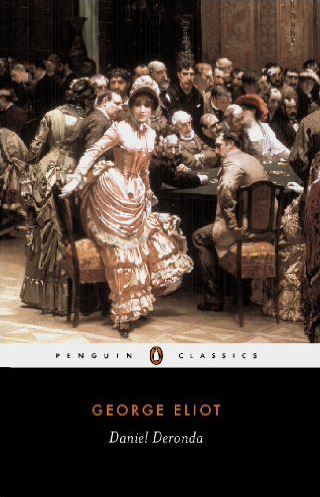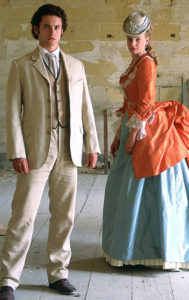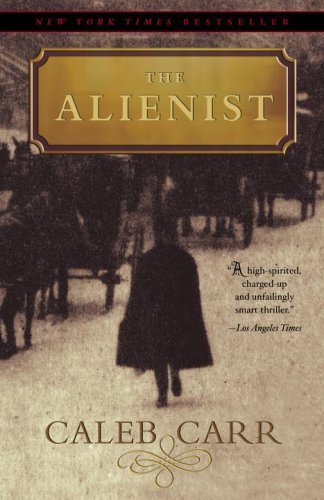I’ve been trying to decide whether to include George Eliot’s final and most controversial novel, Daniel Deronda, on the 17th Street book blogs since I finished reading it over a month ago. Although Caleb Carr has never mentioned George Eliot as an inspiration for his work, this challenging novel explores several themes that may be of interest to Alienist readers. As a result, for the 11th anniversary of 17th Street, I have decided to go ahead and share my thoughts on one of the most fascinating psychological studies of human character, relationships, and society that I’ve read to date.
What’s it about?
Gwendolen Harleth is about to gamble away her family fortune at the roulette table when she notices the enigmatic Daniel Deronda watching her from across the room. From this moment on, the stories of these two contrasting protagonists become intertwined as they face challenges that take them down very different paths. Although the unconventional Gwendolen makes choices that might appear to be conservative on the surface, they lead her into realms of moral uncertainty from which she struggles to escape. On the other hand, the extremely conventional Daniel’s search for belonging and identity is taken down an unexpected and unconventional path when he encounters a young Jewish woman who is also searching for her family.
George Eliot states early in the novel that, “Men, like planets, have both a visible and an invisible history.” In the way she masterfully charts the stories of these two fascinating characters, Eliot successfully demonstrates that it is indeed possible to “thread the hidden pathways of feeling and thought which lead up to every moment of action, and those moments of intense suffering which take the quality of action — like the cry of Prometheus, whose chained anguish seems a greater energy than the sea and sky he invokes and the deity he defies.”
My thoughts
Daniel Deronda, Chapter 51
“Oh — the reasons for our actions! … When you are as old as I am, it will not seem so simple a question — ‘Why did you do this?’ People talk of their motives in a cut and dried way. Every woman is supposed to have the same set of motives, or else to be a monster. I am not a monster, but I have not felt exactly what other women feel — or say they feel, for fear of being thought unlike others. When you reproach me in your heart for sending you away from me, you mean that I ought to say I felt about you as other women say they feel about their children. I did not feel that. I was glad to be freed from you.”
For any visitors who have read The Angel of Darkness, my decision to open this book blog with the preceding quote should go a long way toward explaining why I feel this novel may be of interest to Alienist readers. While the role of women in society, and more particularly the role that mothers play in their children’s development, are prominent themes in The Alienist, they become the central themes in The Angel of Darkness when we encounter a woman whose struggles in this area motivate her criminal behaviour. Moreover, in both books Sara Howard’s character helps readers understand the feeling of frustration many women in the nineteenth century would have experienced at the expectation that women needed to marry and have children in order to be considered ‘whole’.
As the preceding quote suggests, several of the women in Daniel Deronda share these sentiments, and do not conform to the nineteenth century’s ideal for womanhood, particularly with regard to having children. Indeed, the novel’s protagonist, Gwendolen Harleth, describes early in the novel just how limited the options were for women in the nineteenth century, and how frustrating this could be for women of a more independent or spirited temperament.
Daniel Deronda, Chapter 13:
“We women can’t go in search of adventures — to find out the North-West Passage or the source of the Nile, or to hunt tigers in the East. We must stay where we grow, or where the gardeners like to transplant us. We are brought up like the flowers, to look as pretty as we can, and be dull without complaining. That is my notion about the plants: they are often bored, and that is the reason why some of them have got poisonous.”
Related to this, another prominent theme in Daniel Deronda is the search for belonging and the struggle with ‘otherness’. Specifically, from a young age the title character never felt as though he fit in to his own family or society. As a result of this, he has a desire to understand those who represent ‘otherness’ in his society (whether through class, religion, or unconventional attitudes), and it is through this that he comes to learn his true identity, and embrace those elements of himself that have always made him feel different from those around him.
This struggle with ‘otherness’ can also be found in the Alienist books where we encounter many characters who also find it difficult to fit in. For example, in addition to Sara’s struggles with societal expectations, we have John Moore who was the self-described “black sheep” of his family, Laszlo Kreizler who was constantly told by his father that he was nothing more than an “imposter”, and the Isaacson brothers who are viewed with suspicion on the police force for their new ideas as well as their religion. Indeed, this theme is strengthened even further in The Angel of Darkness when we encounter numerous supporting characters who are considered “odd” by society due to their unusual physical characteristics or behaviours, but are portrayed sympathetically and find friends in the more open-minded characters like Stevie Taggert.
Daniel Deronda, Chapter 17:
“I am English-born. But I am a Jewess … Do you despise me for it?”
”Why should I?” said Deronda. “I am not so foolish.”
“I know many Jews are bad.”
”So are many Christians. But I should not think it fair for you to despise me because of that.”
Tied to Daniel Deronda’s overarching theme of identity is another of the reasons I have decided to recommend it to Alienist readers. Namely, that it is one of the few novels written in the nineteenth century that attempts to sensitively portray the Jewish experience in British society at a time when anti-Semitism was particularly high. Given that the Alienist novels contain two well-loved characters that represent this experience in American society, part of my own motivation in picking up Daniel Deronda was to better understand the struggles that arose for Jewish immigrants and their children during this time period.
In saying this, it is worth remembering that even though one of George Eliot’s aims in writing Daniel Deronda was to accurately portray the Jewish community and early Zionist politics, this is one of the novel’s most controversial aspects as well. Some critics over the years have gone so far as to argue that Eliot should have removed the Jewish sections of the book, contending that the author fell into her own form of stereotyping through her portrayal of moneylenders, Jewish mystics, and so on. On the other hand, an 1899 essay in the Ha-Shilo’ah periodical argued that Eliot should have removed the gentile sections of the book in order to focus exclusively on the Jewish themes. Clearly, this is a controversy that is going to continue for as long as the book is read. However, my own view is that provided you approach the novel with these arguments in mind, there is always going to be something to be gained in the reading.
Finally, Daniel Deronda touches on some of the prominent themes relating to mental health found in the Alienist books as well. Specifically, while many of characters in the Alienist books experience physical abuse or emotional neglect at the hands of their parents, in Daniel Deronda we encounter characters have been abandoned by a parent or who have had to escape from an abusive parent, a character who nearly commits suicide as a result of the treatment they received by their parent, and another who finds themselves trapped in an abusive marriage and starts to respond with rage that they find difficult to control. Eliot’s writing of these relationships and the type of characters who develop as a result of them is sensitive and insightful, particularly for the time period in which she was writing.
As should hopefully be clear by now, Daniel Deronda is a novel that many Alienist readers might get something out of. Whether you would like to learn more about how society perceived Jewish immigrants in the nineteenth century, are interested in a nuanced analysis of the struggles faced by women during this period, or are interested in Eliot’s masterful psychological study of human character, I unhesitatingly recommend this novel. Just beware that it isn’t the easiest of the classics I have recommended on the 17th Street book blogs to date. However, what you will get out of the novel is well worth whatever effort you decide to put into it.



